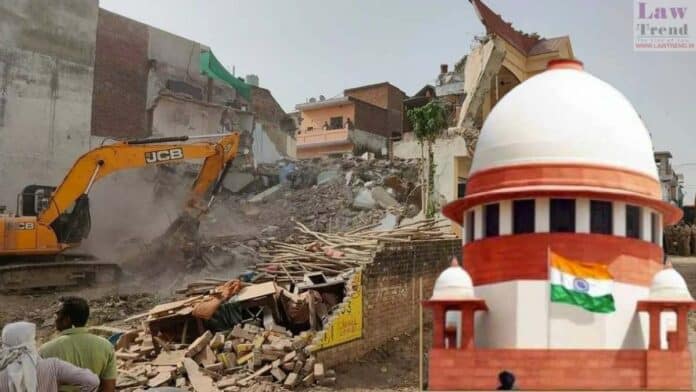The Supreme Court today strongly criticized the practice of demolishing houses merely because they belong to individuals accused in criminal cases, referring to it as ‘bulldozer justice.’ The court raised fundamental questions about the legality and fairness of such actions, emphasizing the need for guidelines to regulate demolition procedures.
Senior Advocate Dushyant Dave, representing the petitioners, urged the court to issue directives that would prevent the arbitrary demolition of properties across the country. “We need clear and fair guidelines to ensure that ‘bulldozer justice’ is not used as a punitive measure without proper legal grounds,” he stated.
Addressing the bench comprising Justice B.R. Gavai and Justice K.V. Viswanathan, Solicitor General of India Tushar Mehta clarified that demolishing immovable property solely because the owner is an accused in a criminal case is not permissible. “Demolition can only be justified if the property in question is illegal,” Mr. Mehta argued, while also contending that the matter is being misrepresented before the court.
Justice Gavai responded to this by suggesting that the court would consider issuing guidelines based on this stance. “How can a demolition occur just because a person is an accused or even a convict? If the construction is unauthorized, fine. But there needs to be some streamlining. We will lay down a procedure,” Justice Gavai remarked.
The bench further emphasized the necessity for a documented process, underscoring that demolition should only occur in the event of a violation of municipal laws. Justice Viswanathan added, “Why can’t directions be issued to prevent such cases? There should be a proper procedure—first a notice, then time to respond, and an opportunity to seek legal remedies before any demolition.”
The court maintained that it was not defending illegal constructions but stressed the importance of having a consistent and fair approach to demolitions. “There should be guidelines to ensure that demolitions are not arbitrary,” the bench noted.
The petitioners’ legal team, including Senior Advocates Dushyant Dave and C.U. Singh, highlighted specific instances where properties were demolished without following due process. Referring to the demolition in Delhi’s Jahangirpuri, they pointed out cases where houses that had been rented out were razed because of the alleged actions of tenants. “Homes that were 50-60 years old were demolished because a tenant or the owner’s son was involved in a crime,” Mr. Singh said, citing examples from Madhya Pradesh and Udaipur.
Another example discussed was the demolition of a house in Rajasthan’s Udaipur after a student residing there stabbed a classmate. Justice Viswanathan expressed concern, saying, “If a man’s son is a nuisance, demolishing his home is not the right way.”




